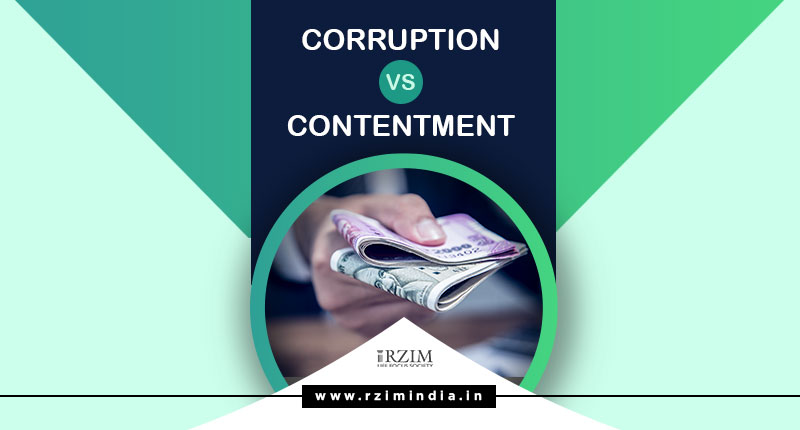Corruption vs Contentment

by Tejdor Tiewsoh
I was recently invited to a house warming dinner and in the course of conversation, the hostess shared about the different permissions she had to obtain in building the house. When officials went for inspection prior to issuing the no-objection certificate (NOC), many objections, some quite baseless, were raised. Apparently, realising what was happening, the owner invited them for a cup of tea and also gave them ‘a gift’. Immediately, all objections were cleared and the much needed NOC was granted. Perhaps, this is an all too familiar story in a country where for anything to get done at all, one is easily tempted to shower the ‘right people’ with the ‘right gift’.
The disease of corruption has eaten away into the very fabric of our society infecting every strata and level of life, be it economic, political, social and even, Academia and Religion.
Corruption, a much spoken-about word in today’s world, is the misuse of a public office or a position of authority for private material or social gain at the expense of other people. Among a long list of probable reasons as to why people may be corrupt, let me point out four: First, the magnetic pull of materialism which consumes us with an insatiable appetite to ‘possess more! enjoy more! relax more!’ In a system where attractively-packaged advertisements continuously flash before our eyes, we are easily lured into wanting and buying things we have absolutely no need of, in the first place. We always imagine that contentment and happiness lie just beyond the next income level. Certainly, money can buy comfort and offer us some security up to a point, but it offers us nothing that will last or that will ultimately satisfy us.
Secondly, peer pressure: In the past, we talked about only young people succumbing to peer pressure but now, more and more I realized that older ones too, face the onslaught of peer pressure on an almost ongoing basis. The old commercial jingle of a television – “Neighbour’s Envy, Owner’s Pride” – taps into this truth. The pressure to own a bigger house or drive a faster car that will be the envy of all our friends and neighbours and pander to our sense of pride and self-importance can easily push us to the brink of corruption.
Thirdly, we live in a world where money is worshipped as a god (both figuratively and literally in certain belief systems) representing power, influence and success, feeding into the idea that if we have money we can influence anyone and buy anything.
Fourthly, the root of all corruption stems perhaps, from the darkness within our own hearts that relentlessly pushes us, sometimes in spite of ourselves, into manipulating and exploiting others for our own gain.
In scripture, a story is told about a rich young man who came to Jesus with a question – “What must I do to inherit eternal life?” Jesus replied, “obey the commandments”, adding, “if you want to have treasures in heaven, sell all you have and give to the poor and then follow me”. The young man walked away from Jesus, sad. He had much wealth that he simply could not bear to give it up. His temporal wealth made him turn away from the one, true source of all wealth and riches, riches that will last and give true satisfaction. The material can, so many a time, blind our sight, delude our minds and captivate our hearts so that we are led away from love, worship and undivided allegiance to God.
How then shall we live in a culture that worships money? I think the answer is to live a life of contentment. The Gospel of Jesus Christ is neither a prosperity nor a poverty Gospel but it is a Gospel of Contentment. Paul, the Apostle, said, “I have learnt to be content whether in need or plenty; I can do everything through him who gives me strength” (Philippians 4: 11-13) because he has discovered, and keeps on discovering, the all-sufficiency of God’s resources. Christian contentment is not dependent on outward circumstances but it arises from our fellowship with Christ; It means that we rely daily on God’s resources, live under His watchful eye and enjoy His fatherly care. When we are content with what we have, we will not keep grasping for more; we are not tempted to define our identity by what we do, or have, or achieve but bow to the will of God, trusting Him more fully and acknowledging His good purposes for our lives. For Francis of Assisi, the great thirteenth-century monk, contentment means regarding our possessions as ‘God’s gift’, never as ‘God substitutes’.
As disciples of Jesus Christ, we are called to worship not ‘God and Mammon,’ but God and God alone. In explaining the parable of the Sower, Jesus said: “the seeds that fell among thorns could not grow because of the worries of life and the deceitfulness of wealth”. It will do well for us as His disciples to reflect on this truth and be alert to this deceitfulness, otherwise, we will succumb to it and missed out on the joy and fullness of a life of faith, a life lived in Christ, with Christ and for Christ alone.


There are no comments